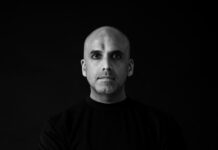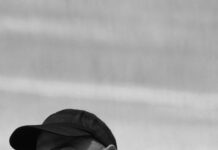Cover photo: Miles Opland (Jay Glass Dubs)
Dimitris Papadatos is a prolific figure in today’s electronic music landscape. Having put out five different releases in 2016, one year after his debut as Jay Glass Dubs, the Athens-born artist found a home on labels such diverse as Berceuse Heroique, Not Waving’s Ecstatic and Bokeh Versions and recently collaborated with poet and songwriter Leslie Winer for a record. As his name already reveals, Papadatos’s musical subject is dub – a technique originally developed in the studios of Jamaica that still resonates throughout the world today. Papadatos focuses on a ”counterfactual historical approach”, as he calls it, which is connected to philosophical and aesthetical concepts like musique concrète. Besides that, he showcases a multi-faceted taste in music on his mixtapes and guest mixes for Hessle Audio, Bokeh Versions, FACT magazine or elsewhere, that does not confine itself to dub alone. In our interview ahead of his performance at Belgium’s Meakusma festival, we talked about him growing up in Greece, survival issues as a musician and his approaches to dub.
Growing up in Greece, how does your first steps into dub music look like? Which works have been seminal for you?
From what I can recall, my first encounters with the broader spectrum of the genre was around the early noughties when I was serving in the Greek Army. I was always into hardcore punk and post-punk and stuff like PiL and Bauhaus but it was when I first listened to Lee ‘Scratch’ Perry’s Return Of The Super Ape that I started to comprehend the dub methodology. Perry, Dennis Bovel, King Tubby of course, Sly And Robbie and Bullwackie are just a few of these geniuses that in many ways have influenced all electronic music from the 70s and forth. I wouldn’t suggest that their music had an influence on starting the Jay Glass Dubs productions though. It was their ideas in the studio that intrigued me, their apprehension of sound in spatial form, the very specific raw musicality added to the fact that their seminal works were there, vibrant and ever fresh, available for research and contemplation. I don’t connect my work to dub as a blatant appropriation of the genre. It is more about the methodology than anything else.
Tell me about Athens and its influencing aspects that it has for you – is there a dub scene?
Greece has a rather strong sound system culture but I was never part of it in any way. There are sound clashes that I attend once in a while and I am aware of groups of people that do amazing work in that scene. On the other hand there are countless bands and artists that incorporate the genre’s vibe in parallel with the warmness of the weather to make some summer season pocket money by pursuing their faulty beach-induced image of dub music for generations to come. Athens luckily is a city that has a very dark aspect to it, and I feel and hope it resonates through my music. Athens has very specific problems. The biggest is that there is no vital space for artists to flourish and take their work to another level. There are no fundings, no state support whatsoever. For example, most of the money that are to be spent for cultural purposes go into archaeology. In many ways, Greece is stuck with the image of its glorious past, the only monetizable aspect of the country. Of course there are amazing things happening. Great visual artists and musicians work in the city at the moment, there are artist-run spaces that do fantastic work, nice little venues for concerts and parties but all of that is doomed to maintain a DIY character since the financial support is so limited. What’s inspiring about Athens though is its rough and anarchic nature, especially underlined by the most confronting sun light. We have learned from a very young age that nothing remains hidden under the sun and that is simply priceless.





